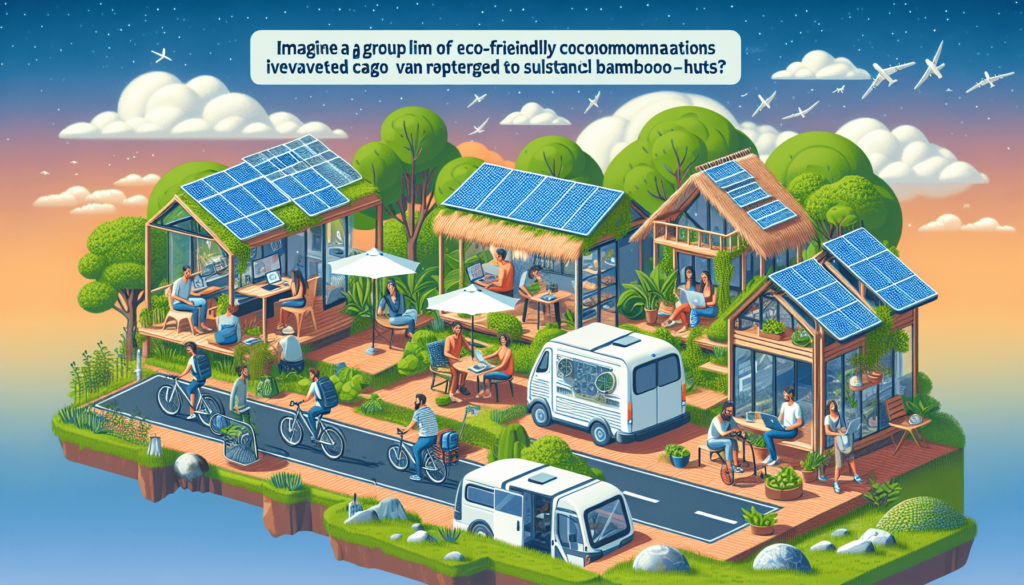In the fast-paced era of digital nomads, a new trend is taking the travel world by storm – eco-friendly travel. As these adventurous individuals jet-set across the globe, their focus is not only on experiencing new cultures and locations, but also on making a positive impact on the environment. With sustainability at the forefront of their minds, digital nomads are embracing a more ethical approach to travel, from choosing eco-friendly accommodations to supporting local businesses that prioritize conservation efforts. Join this growing movement as we explore the rise of eco-friendly travel among digital nomads and how it is reshaping the way we explore the world.
Definition of Digital Nomads
Digital nomads are individuals who have embraced a modern way of working and living, where they have the freedom to work remotely and travel the world at the same time. They are not tied down to a specific location and can often be found exploring new destinations while working from their laptops. The concept of being a digital nomad has gained popularity in recent years, attracting individuals from various professions such as freelancers, entrepreneurs, and remote employees.
Working remotely
Working remotely means carrying out your professional duties and responsibilities from any location of your choice, as long as you have a stable internet connection. This allows digital nomads to work while they travel, granting them the flexibility to explore new places without sacrificing their careers. With technology advancements and the increasing availability of remote work opportunities, more people are choosing this lifestyle, as it enables them to blend work and travel seamlessly.
Global community
Being a digital nomad allows you to become part of a global community of like-minded individuals who share the same passion for travel and remote work. This community provides support, connections, and valuable resources for navigating the challenges and opportunities that come with a nomadic lifestyle. Digital nomads often connect through online platforms, social media groups, and coworking spaces, creating a network of professionals who understand and appreciate the unique demands of their lifestyle.
Flexible lifestyle
One of the main appeals of being a digital nomad is the ability to create a flexible lifestyle. You have the freedom to choose when and where you work, giving you the opportunity to design your days according to your preferences. This flexible lifestyle allows digital nomads to prioritize experiences and personal growth, as they have the ability to explore different cultures, indulge in new activities, and even adjust their working hours to align with their desired schedule.
Emergence of Eco-Friendly Travel
As digital nomads continue to explore destinations around the world, there has been a notable increase in the adoption of eco-friendly travel practices. More and more nomads are becoming environmentally conscious and are actively seeking ways to minimize their negative impact on the planet. This shift towards eco-friendly travel can be attributed to two main factors: increasing global awareness and the recognition of the environmental impact of travel.
Increasing global awareness
In recent years, there has been a growing awareness and concern regarding environmental issues such as climate change, deforestation, and pollution. This global awareness has led many individuals, including digital nomads, to reevaluate their lifestyle choices and make conscious efforts to reduce their carbon footprint. With information readily available and a growing emphasis on sustainability, digital nomads are taking steps towards incorporating eco-friendly practices into their travel routines.
Sustainable practices
Eco-friendly travel encompasses a range of sustainable practices that aim to protect the environment and local communities. Digital nomads are actively seeking out accommodations, transportation options, and activities that align with these principles. By choosing to support businesses and destinations that prioritize sustainable practices, digital nomads can contribute to the preservation of natural resources and the overall well-being of the places they visit.
Environmental impact
While travel can be enriching and transformative, it also has a significant impact on the environment. The tourism industry is a major contributor to carbon emissions, waste generation, and pollution. Recognizing this, digital nomads are advocating for responsible travel practices that minimize their environmental impact. By adopting eco-friendly travel habits, they can reduce their carbon footprint and play a role in preserving the beauty and integrity of our planet for future generations.

Benefits of Eco-Friendly Travel for Digital Nomads
Choosing eco-friendly travel options not only benefits the planet, but it also offers a range of advantages for digital nomads themselves.
Reduced carbon footprint
By making conscious decisions to reduce their carbon footprint, digital nomads can contribute to the fight against climate change. Opting for eco-friendly transportation, accommodation, and accessories can significantly decrease the environmental impact of their travels. By embracing sustainable practices, digital nomads can travel with a clear conscience, knowing that they are actively working towards a greener future.
Authentic cultural experiences
Eco-friendly travel often encourages digital nomads to immerse themselves in local cultures and traditions. By supporting local businesses, staying in eco-lodges, and engaging in community projects, digital nomads can gain a deeper understanding and appreciation for the destinations they visit. This opens up opportunities for authentic cultural experiences that go beyond surface-level tourism, allowing digital nomads to forge meaningful connections with local communities.
Health and well-being
Eco-friendly travel practices often go hand in hand with prioritizing health and well-being. By choosing destinations that offer outdoor activities and natural landscapes, digital nomads can enjoy the physical and mental benefits of being in nature. Participating in responsible tourism initiatives and engaging in activities that support the local environment can also contribute to a sense of fulfillment and purpose, enhancing overall well-being.
Eco-Friendly Accommodation Options
When it comes to choosing eco-friendly accommodations, digital nomads have a variety of options that align with their values.
Eco-lodges and sustainable resorts
Eco-lodges and sustainable resorts are specifically designed with environmental considerations in mind. These accommodations often feature renewable energy sources, wastewater management systems, and sustainable building materials. By staying in eco-lodges, digital nomads can support responsible tourism practices and enjoy their travels while minimizing their impact on the environment.
Green hostels and coliving spaces
Green hostels and coliving spaces provide budget-friendly options for digital nomads who are looking for eco-friendly accommodations. These establishments prioritize energy efficiency, waste reduction, and community engagement. By staying in green hostels and coliving spaces, digital nomads can meet like-minded individuals and participate in sustainability-focused initiatives.
Camping and van life
For digital nomads who crave a closer connection to nature, camping and van life offer unique opportunities for eco-friendly accommodation. By embracing these alternative lifestyles, digital nomads can reduce their reliance on traditional accommodations, saving resources and minimizing their ecological footprint. Camping and van life also provide the freedom to explore and experience the natural beauty of various destinations.

Eco-Friendly Transportation Choices
Transportation choices can greatly impact a digital nomad’s carbon footprint, and opting for eco-friendly alternatives can make a significant difference.
Public transportation
Using public transportation, such as buses, trains, and trams, is often a more sustainable choice compared to private vehicles. Digital nomads can take advantage of local public transport systems, promoting reduced emissions and decreasing traffic congestion. Public transportation also offers the opportunity to interact with local communities and experience a destination from a unique perspective.
Biking and walking
Biking and walking are not only eco-friendly transportation options but also provide a chance for digital nomads to exercise and explore their surroundings at a leisurely pace. Many cities offer bike-sharing programs, making it convenient for nomads to commute sustainably. By prioritizing active transportation, digital nomads can minimize their carbon footprint while enjoying the sights and sounds of their chosen destinations.
Electric vehicles
As electric vehicles become more widespread, they also present a greener transportation option for digital nomads. Electric scooters and bikes, as well as electric vehicle rentals, offer an eco-friendly and convenient way to get around. By utilizing electric vehicles, digital nomads can enjoy the flexibility of personal transportation while reducing their reliance on fossil fuels and minimizing emissions.
Eco-Friendly Travel Accessories
In addition to sustainable accommodations and transportation, eco-friendly travel accessories play a vital role in reducing waste and promoting a greener lifestyle.
Reusable water bottles and coffee cups
Single-use plastic bottles and coffee cups are major contributors to plastic pollution. By bringing a reusable water bottle and coffee cup, digital nomads can minimize their plastic waste and make a positive impact on the environment. Many destinations have water refill stations and cafes that offer incentives for using reusable containers, making it easy for nomads to stay hydrated and caffeinated while on the go.
Eco-friendly toiletries
Opting for eco-friendly toiletries, such as biodegradable soaps, shampoos, and toothpaste, can significantly reduce the use of harmful chemicals and plastic packaging. Digital nomads can choose from a range of sustainable and natural products that cater to their hygiene needs. By prioritizing these alternatives, they can actively contribute to a healthier planet and protect fragile ecosystems.
Solar-powered chargers
Digital nomads heavily rely on electronic devices, which often need frequent charging. Solar-powered chargers offer a sustainable solution, harnessing the energy of the sun to power devices while on the move. By utilizing solar power, digital nomads can reduce their dependence on electricity grids powered by non-renewable energy sources, minimizing their ecological impact while maintaining their connectivity.
Sustainable Food Choices
Choosing sustainable food options not only supports local communities but also contributes to a more environmentally friendly travel experience.
Vegetarian and vegan options
Reducing meat consumption is an effective way to lower greenhouse gas emissions and conserve resources. Digital nomads can choose vegetarian or vegan options when dining out, supporting restaurants that prioritize locally sourced, plant-based ingredients. This not only benefits the environment but also promotes healthier lifestyles and encourages culinary exploration of new flavors and cuisines.
Supporting local farmers and markets
Engaging with local farmers and markets is an excellent way for digital nomads to support the local economy and reduce the carbon footprint associated with food transportation. By shopping at farmers’ markets and choosing locally grown produce, digital nomads can experience the freshest ingredients and contribute to sustainable agricultural practices. This also allows for a more intimate connection with the local community and culture.
Minimizing food waste
Food waste is a significant environmental issue, contributing to greenhouse gas emissions and resource depletion. Digital nomads can minimize food waste by being mindful of portion sizes, practicing proper storage methods, and choosing establishments that prioritize reducing food waste. By adopting these habits, digital nomads can contribute to sustainable food systems and actively combat global hunger and food insecurity.
Engaging in Responsible Tourism
Responsible tourism is about respecting the environment, local cultures, and communities. Digital nomads can play an integral role in promoting responsible tourism practices.
Respecting local cultures and customs
Digital nomads can engage with local cultures and customs in a respectful manner by learning about the history, traditions, and etiquette of the places they visit. Respecting local customs and adhering to cultural norms fosters meaningful connections with locals and helps preserve cultural heritage. By embracing diversity and inclusivity, digital nomads can create positive interactions that enrich their own experiences as well as those of the local communities.
Supporting ethical wildlife encounters
Digital nomads can make informed choices and support ethical wildlife encounters, refraining from activities that exploit animals or contribute to their suffering. By researching and opting for responsible tour operators and sanctuaries, digital nomads can have unforgettable experiences while ensuring the well-being and conservation of wildlife. Supporting ethical wildlife encounters is an opportunity to become advocates for animal welfare and contribute to the preservation of biodiversity.
Participating in community projects
Engaging in community-driven projects and initiatives provides digital nomads with the opportunity to give back to the communities that host them. By volunteering in conservation efforts, education programs, or community development projects, digital nomads can actively contribute to positive change. Participating in community projects not only benefits the local communities but also offers an enriching experience and an avenue for personal growth.
Choosing Eco-Friendly Destinations
Digital nomads can make a conscious effort to choose destinations that prioritize sustainability and have strong environmental regulations.
Countries with strong environmental regulations
Some countries have implemented stringent environmental regulations to protect their natural resources and ecosystems. Digital nomads can choose to support these countries that prioritize sustainability and responsible tourism practices. By visiting destinations with strong environmental regulations, digital nomads can explore breathtaking natural landscapes while knowing their presence is contributing to the preservation of these valuable ecosystems.
Protected areas and national parks
Protected areas and national parks are ideal destinations for eco-conscious digital nomads. These areas are established to conserve biodiversity and provide opportunities for sustainable tourism. Digital nomads can support these protected areas by adhering to park rules, minimizing their impact on delicate ecosystems, and promoting responsible tourism practices. By exploring these natural wonders, digital nomads can experience the beauty of our planet while actively contributing to its preservation.
Off-the-beaten-path locations
Choosing off-the-beaten-path locations allows digital nomads to explore lesser-known destinations that often offer unique and authentic experiences. By venturing to these less-frequented areas, digital nomads can avoid overcrowding and reduce the strain on popular tourist destinations. This promotes sustainable tourism and provides an opportunity to connect with local communities on a deeper level.
Joining Digital Nomad Communities and Initiatives
Digital nomad communities and initiatives provide a supportive network for connecting with like-minded individuals while promoting eco-friendly practices.
Online platforms for eco-conscious nomads
There are numerous online platforms and communities that cater specifically to eco-conscious digital nomads. These platforms offer resources, advice, and opportunities for collaboration with other individuals who are passionate about sustainability and responsible travel. By joining these communities, digital nomads can gain valuable insights, share experiences, and actively engage in discussions that promote eco-friendly practices.
Volunteering in sustainable projects
Volunteering in sustainable projects is a meaningful way for digital nomads to give back to the communities they visit. Many organizations and initiatives offer volunteer opportunities that focus on environmental conservation, sustainable development, and community empowerment. By dedicating their time and expertise to these projects, digital nomads can make a positive impact and leave a lasting legacy in the destinations they explore.
Organizing eco-friendly events and meetups
Digital nomads have the power to create change by organizing eco-friendly events and meetups within their communities. By planning events that prioritize sustainability, such as beach cleanups, educational workshops, or eco-friendly business gatherings, digital nomads can inspire others to adopt eco-conscious practices. These events provide a platform for sharing knowledge and ideas, encouraging collective action towards a more sustainable future.
In conclusion, the rise of eco-friendly travel among digital nomads is a positive and significant trend. As individuals who have the freedom to work remotely and travel extensively, digital nomads are in a unique position to make sustainable choices and actively contribute to a greener future. By embracing eco-friendly accommodations, transportation options, and travel accessories, digital nomads can minimize their carbon footprint and leave a positive impact on the destinations they visit. Engaging in responsible tourism, choosing sustainable food options, and supporting ethical initiatives further enhance their eco-friendly lifestyle. By joining digital nomad communities and initiatives, digital nomads can connect with others who share their passion for sustainability, exchange ideas, and promote eco-conscious practices. Ultimately, the combination of being a digital nomad and an eco-conscious traveler allows individuals to experience the world while actively preserving it for future generations.

